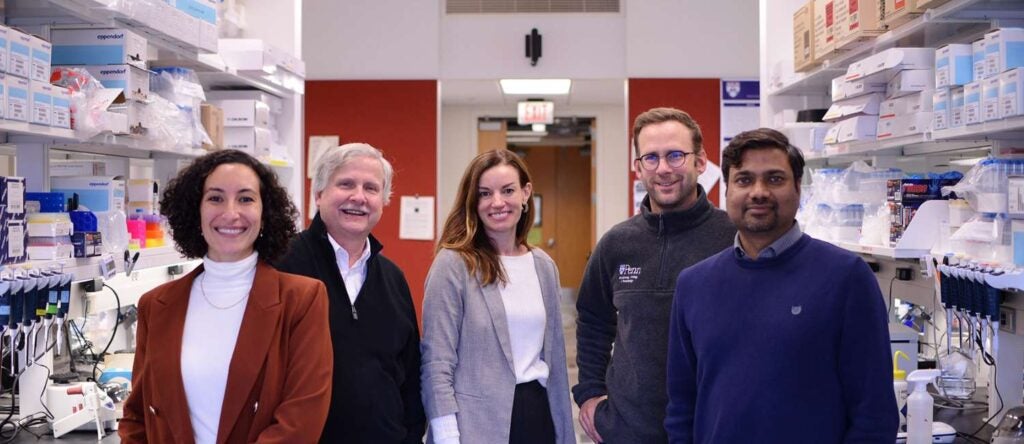Scott Laboratory
Scott Laboratory’s current research is focused on understanding the development, regulation, and maintenance of CD4+ and CD8+ T cells in order to design new vaccines and immunotherapies for infectious diseases. The laboratory primarily focuses on experimental murine infections with the protozoan parasite, Leishmania, which provides a well-characterized model of T-helper cell differentiation.
Our Research
Scott Laboratory’s research centers on elucidating the immune responses associated with the protozoan parasite Leishmania, to inform the development of vaccines and immunotherapies for infectious diseases, particularly leishmaniasis. The research focuses on the development, regulation, and maintenance of protective and pathological CD4+ and CD8+ T cell responses. By integrating findings from experimental murine models and studies conducted on Leishmania braziliensis patients in Brazil, the lab generates new hypotheses from human data and rigorously tests them through mechanistic experiments in mice.
Currently, the lab’s research is organized around three main areas:
- Understanding the development and maintenance of CD4+ tissue-resident memory T-cells to facilitate their use in vaccine design
- Investigating the role of the skin microbiome in modulating immune responses to leishmaniasis
- Defining the role malnutrition plays in leishmaniasis.
The laboratory has established longstanding collaborations, including Dan Beiting, who supports gene expression studies, Elizabeth Grice, who collaborates on microbiome research, and Edgar Carvalho and Lucas Carvalho, who provide essential expertise and collaboration from Brazil.
Funding Agency Grant
| Grantor | Title |
|---|---|
| NIH | IL-12 As an Immunopotentiator in Leishmaniasis |
| NIH | Initiation of Immune Response in Chronic Leishmaniasis |
| NIH | Myeloid Lineage Cells and Immunopathology in Leishmania |
Publications
Cutaneous Leishmaniasis Induces a Transmissible Dysbiotic Skin Microbiota that Promotes Skin Inflammation. Gimblet, C., Meisel, J. S., Loesche, M. A., Cole, S. D., Horwinski, J., Novais, F. O., Misic, A. M., Bradley, C. W., Beiting, D. P., Rankin, S. C., Carvalho, L. P., Carvalho, E. M., *Scott, P., *Grice, E. A. Cell Host & Microbe. 22: 13-24 e4, 2017. PMCID: PMC555537* Co-corresponding authors.
Microbiota instruct IL-17A-producing innate lymphoid cells to promote skin inflammation in cutaneous leishmaniasis. Singh TP, Carvalho AM, Sacramento LA, Grice EA, Scott P. Plos Pathogens 2021 Oct 26;17(10):e1009693. PMCID: PMC8570469
Multiomic profiling of cutaneous leishmaniasis infections reveals microbiota-driven mechanisms underlying disease severity. Farias Amorim C, Lovins VM, Singh TP, Novais FO, Harris JC, Lago AS, Carvalho LP, Carvalho EM, Beiting DP, Scott P, Grice EA. Science Translational Medicine. 2023;15(718):eadh1469. Epub 20231018. doi: 10.1126/scitranslmed.adh1469. PubMed PMID: 37851822. *Co-corresponding authors.
Regulatory T cells control Staphylococcus aureus and disease severity of cutaneous leishmaniasis. Singh, TP, Amorim, CF, Lovins, VM, Bradley, CW, Carvalho, LP, Carvalho, EM, Grice, EA, Scott, P. Journal of Experimental Medicine. 4;220(12):e20230558. 2023. PMCID: PMC10561556
T cell cytotoxicity mediates pathology in the skin by inflammasome activation and IL-1beta production. Plos Pathogens. Novais FO, Carvalho AM, Carvalho, LP, Beiting DP, Brodsky IE, Carvalho EM, Scott P. CD8 2017;13(2): e1006196. PMCID: PMC5325592
Variable gene expression and parasite load predict treatment outcome in cutaneous leishmaniasis. Amorim CF, Novais FO, Nguyen BT, Misic AM, Carvalho, LP, Carvalho EM, Beiting DP, Scott P. Science Translational Medicine. 2019; 11(519),eaax4202. PMCID: PMC7068779
Skin resident memory CD4+ T cells enhance protection against Leishmania major infection. Glennie, N.D., Yeramilli, V.A., Beiting, D.P., Volk, S.W., Weaver, C.T., Scott, P. Journal of Experimental Medicine. 2015 212(9):1405-14. PMCID: PMC4548053
Skin resident CD4+ T cells protect against Leishmania major by recruiting and activating inflammatory monocytes. Glennie, N.D., Volk, S.W., Scott, P.
Plos Pathogens. 2017, 13(4):e1006349. PMCID:PMC5409171

Director, Scott Laboratory
Phillip Scott, PhD
Professor of Microbiology and Immunology, Department of Pathobiology
Find Us
University of Pennsylvania School of Veterinary Medicine
3800 Spruce Street
Philadelphia, PA 19104-4539

Uncovering the role of skin microbiome and immune response in cutaneous leishmaniasis (link is external)
Two new studies led by Phillip Scott of the School of Veterinary Medicine and Elizabeth Grice of the Perelman School of Medicine demonstrate how bacteria found in leishmaniasis skin lesions…
